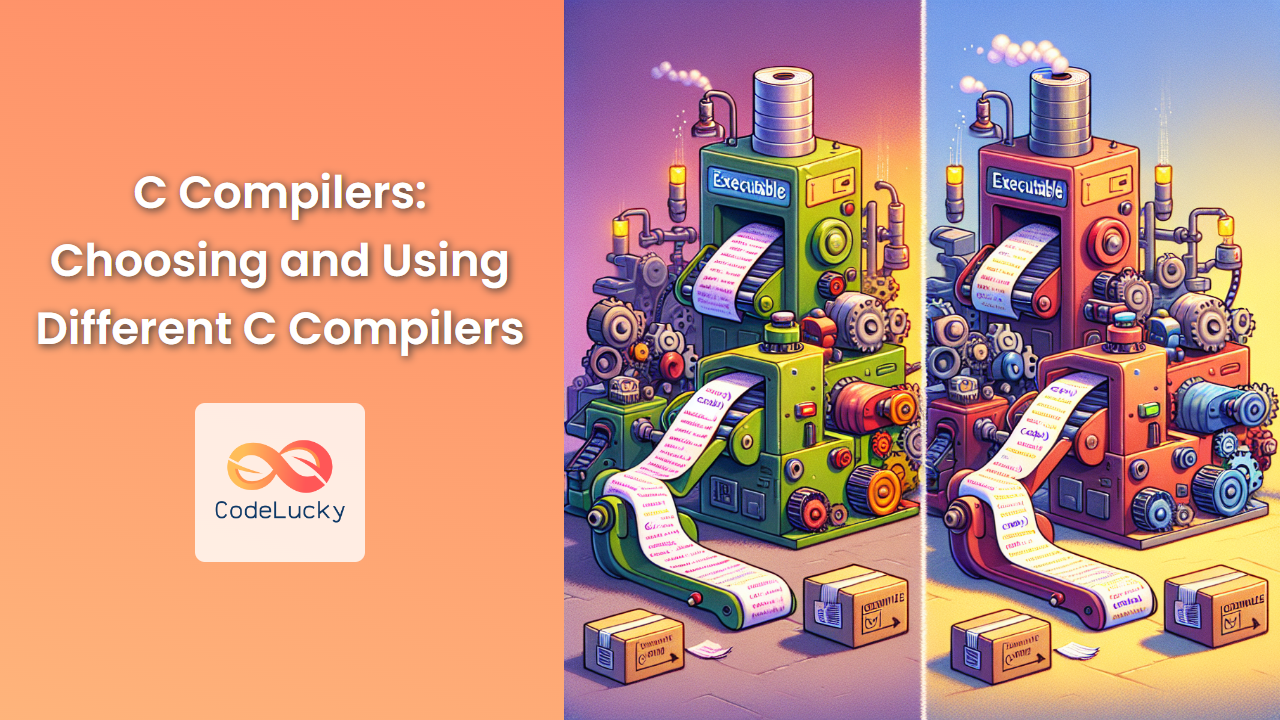In the world of C programming, optimization is generally a good thing. It helps our programs run faster and more efficiently. However, there are times when we need to tell the compiler, "Hey, don't touch this!" That's where the volatile keyword comes into play. Let's dive deep into the world of volatile and discover how it can be a crucial tool in your C programming arsenal.
What is the Volatile Keyword?
The volatile keyword in C is a type qualifier that tells the compiler that a variable's value can change at any time, without any action being taken by the code the compiler finds nearby. This means the compiler should not optimize away reads or writes to the variable.
🚨 Important: The volatile keyword is often misunderstood and misused. It's not a magic bullet for thread safety or atomic operations. Its primary purpose is to prevent certain compiler optimizations.
When to Use Volatile
You might need to use volatile in several scenarios:
- 🖥️ Memory-mapped I/O
- 🕰️ Hardware registers
- 🔄 Variables modified by an interrupt service routine
- 🌐 Variables in multi-threaded applications (with caveats)
Let's explore each of these scenarios with practical examples.
Memory-Mapped I/O
In embedded systems, it's common to have memory addresses that correspond to hardware devices. Reading from or writing to these addresses can have side effects, like sending data over a serial port.
#define SERIAL_PORT 0x3F8
volatile unsigned char* serial_port = (volatile unsigned char*)SERIAL_PORT;
void send_char(char c) {
*serial_port = c;
}
In this example, without volatile, the compiler might optimize away multiple writes to *serial_port if it doesn't see any reads. But each write is actually sending a character, so we need all of them to happen.
Hardware Registers
Similar to memory-mapped I/O, hardware registers can change independently of the program flow.
#define STATUS_REG 0x1234
volatile unsigned int* status = (volatile unsigned int*)STATUS_REG;
void wait_for_ready() {
while ((*status & 0x1) == 0) {
// Wait
}
}
Here, volatile ensures that *status is read in each iteration of the loop. Without it, the compiler might optimize the loop to an infinite loop, assuming the value never changes.
Variables Modified by Interrupt Service Routines
Interrupt Service Routines (ISRs) can modify variables asynchronously, outside the normal flow of the program.
volatile int flag = 0;
void isr() {
flag = 1;
}
int main() {
while (!flag) {
// Do something
}
printf("Flag was set!\n");
return 0;
}
Without volatile, the compiler might optimize the while loop to an infinite loop, as it doesn't see flag being modified in the main function.
Multi-threaded Applications
While volatile is sometimes used in multi-threaded applications, it's important to note that it doesn't guarantee thread safety or atomic operations.
#include <pthread.h>
#include <stdio.h>
volatile int shared_var = 0;
void* thread_func(void* arg) {
for (int i = 0; i < 1000000; i++) {
shared_var++;
}
return NULL;
}
int main() {
pthread_t thread1, thread2;
pthread_create(&thread1, NULL, thread_func, NULL);
pthread_create(&thread2, NULL, thread_func, NULL);
pthread_join(thread1, NULL);
pthread_join(thread2, NULL);
printf("Final value: %d\n", shared_var);
return 0;
}
⚠️ Warning: This code is not thread-safe! volatile ensures that shared_var is always read from and written to memory, but it doesn't prevent race conditions.
The Impact of Volatile on Optimization
Let's look at a simple example to see how volatile affects compiler optimization:
int normal_var = 10;
volatile int vol_var = 10;
void func() {
int a = normal_var;
int b = normal_var;
int c = vol_var;
int d = vol_var;
}
Without optimization, this might compile to something like:
mov eax, [normal_var]
mov [a], eax
mov eax, [normal_var]
mov [b], eax
mov eax, [vol_var]
mov [c], eax
mov eax, [vol_var]
mov [d], eax
With optimization, it might become:
mov eax, [normal_var]
mov [a], eax
mov [b], eax
mov eax, [vol_var]
mov [c], eax
mov eax, [vol_var]
mov [d], eax
Notice how the second read of normal_var was optimized away, but both reads of vol_var remain.
Performance Considerations
Using volatile can have performance implications. Let's look at a benchmark:
#include <time.h>
#include <stdio.h>
#define ITERATIONS 1000000000
int main() {
clock_t start, end;
double cpu_time_used;
// Non-volatile version
int sum = 0;
start = clock();
for (int i = 0; i < ITERATIONS; i++) {
sum += i;
}
end = clock();
cpu_time_used = ((double) (end - start)) / CLOCKS_PER_SEC;
printf("Non-volatile time: %f\n", cpu_time_used);
// Volatile version
volatile int vol_sum = 0;
start = clock();
for (int i = 0; i < ITERATIONS; i++) {
vol_sum += i;
}
end = clock();
cpu_time_used = ((double) (end - start)) / CLOCKS_PER_SEC;
printf("Volatile time: %f\n", cpu_time_used);
return 0;
}
Here are some sample results:
| Version | Time (seconds) |
|---|---|
| Non-volatile | 0.953125 |
| Volatile | 4.015625 |
As you can see, the volatile version is significantly slower. This is because the compiler can't optimize the reads and writes to vol_sum.
Common Mistakes with Volatile
-
Using
volatilefor thread synchronization: As mentioned earlier,volatiledoesn't guarantee thread safety. -
Applying
volatileto the wrong type: Consider this:volatile int* p; // Pointer to volatile int int* volatile p; // Volatile pointer to int volatile int* volatile p; // Volatile pointer to volatile intMake sure you understand which part of the declaration
volatileapplies to. -
Overusing
volatile: Only use it when absolutely necessary, as it can hurt performance and prevent useful optimizations.
Best Practices
- 🎯 Use
volatileonly when you need to prevent specific optimizations. - 🧵 For thread synchronization, use proper synchronization primitives like mutexes or atomic operations.
- 📚 Document why you're using
volatilein your code comments. - 🔍 Be aware of compiler-specific behaviors regarding
volatile.
Conclusion
The volatile keyword in C is a powerful tool when used correctly. It tells the compiler to be careful about optimizing access to a variable because its value might change in ways the compiler can't predict. While it's crucial in certain scenarios like hardware interaction and interrupt-driven code, it's not a solution for thread safety in multi-threaded programs.
Remember, with great power comes great responsibility. Use volatile judiciously, understand its implications, and always consider alternative solutions before reaching for this keyword. Happy coding!



















